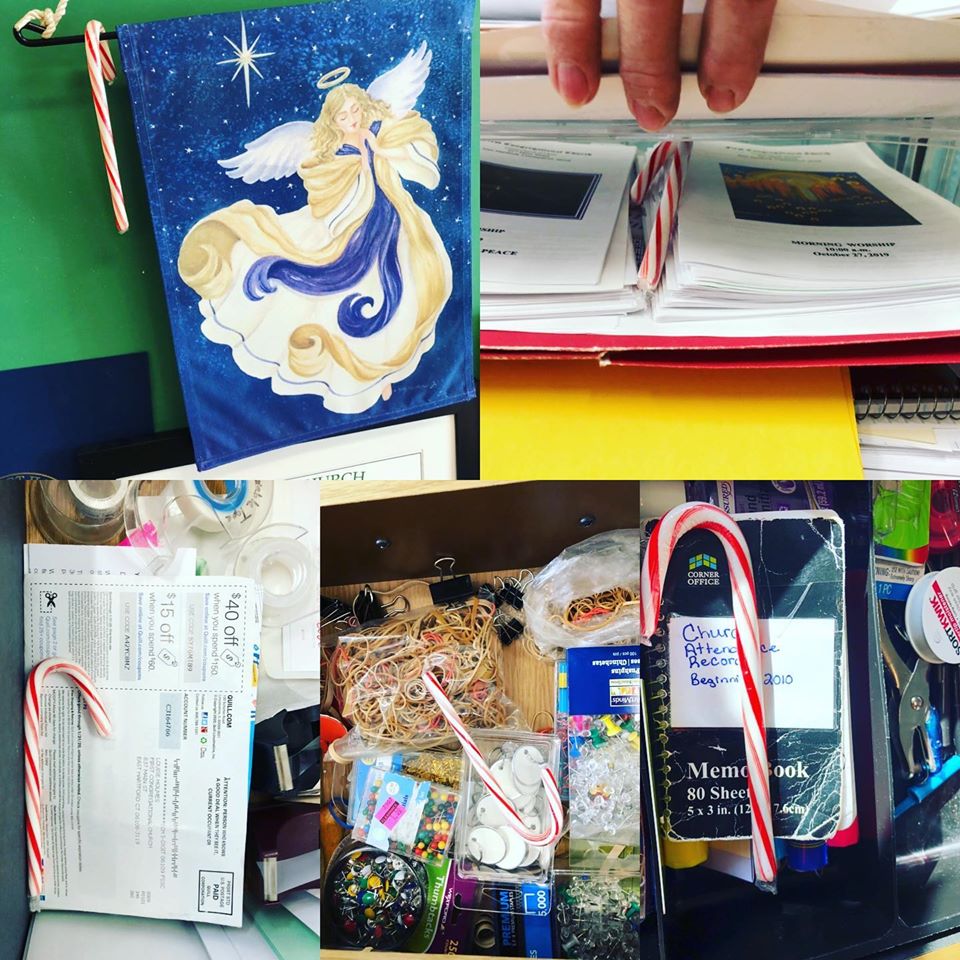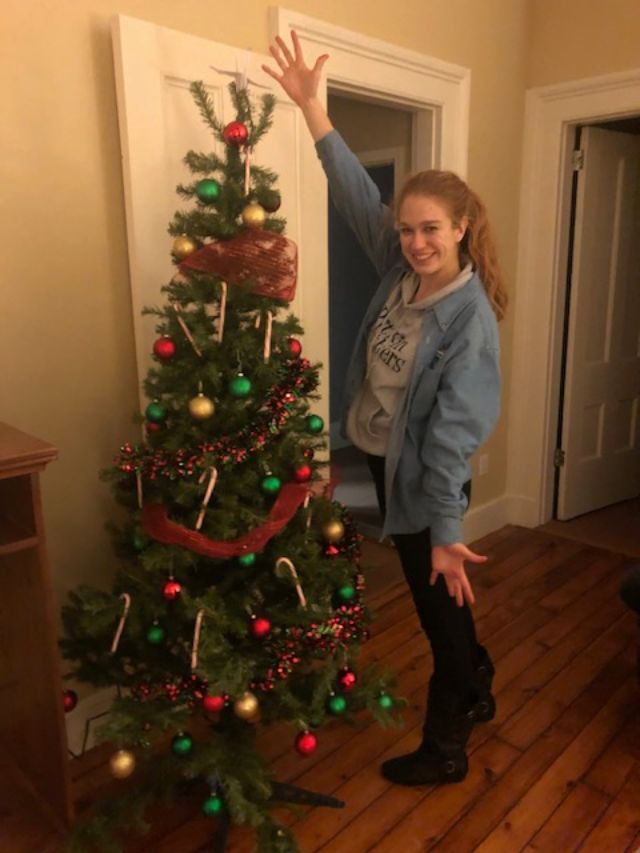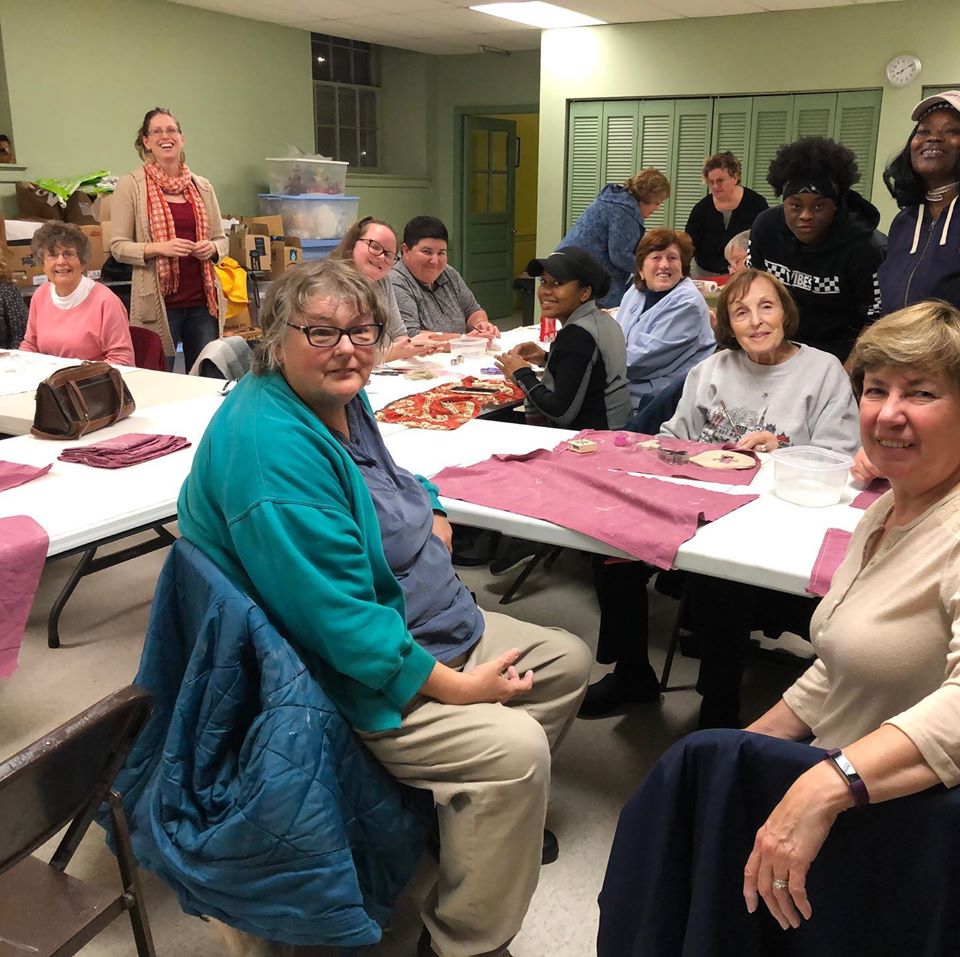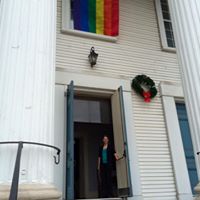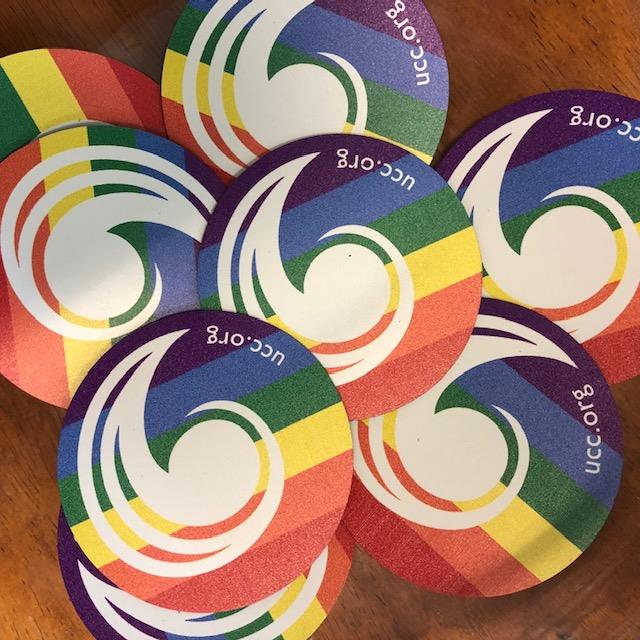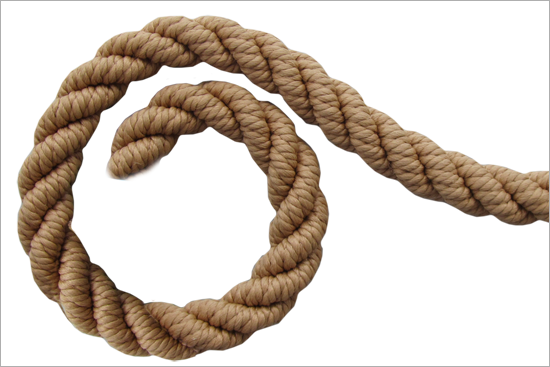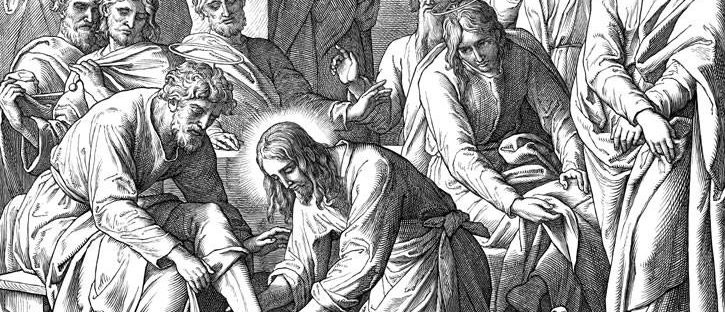Ash Wednesday Worship 2020
By Rev. Kelly Jane Caesar
To do this worship at home you will need a Bible, paper and pencil. Dirt and a vase help as well.
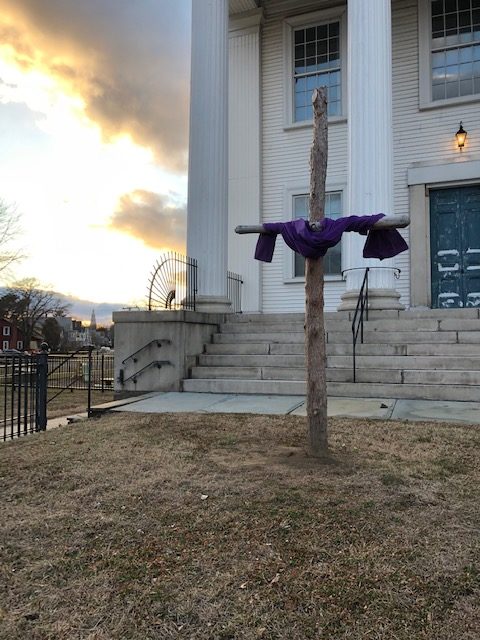
Center yourself with some grounding music then read the 2 letter to the Corinthians, chapter 5 verses 20-21-6″11,
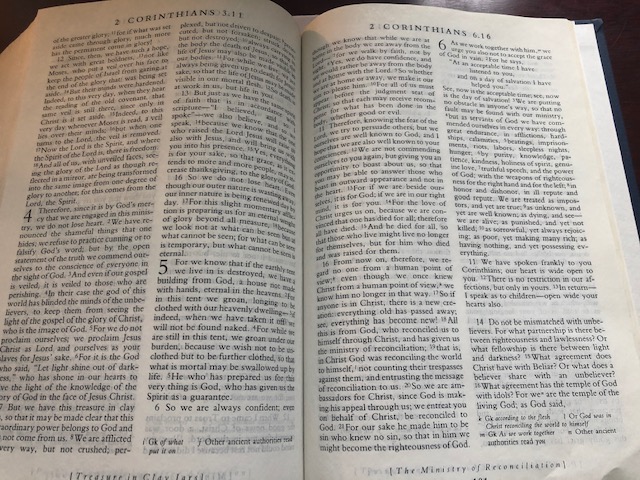
Invitation to Confession
Tonight we come to be reconciled with God.
We will take some quiet moments to reflect on what separates us from the Divine, and perhaps even write our sins down to offer to God.
In our Christian tradition, Ash Wednesday is a time to confess our sins.
Ash Wednesday marks the beginning of the season of Lent,
Traditionally a season of repentance,
a time to give up something that is blocking our relationship with the Divine.
Most churches will give disciples ashes
– dirt to symbolize our humanity.
We recite the words,
“from dust you came and to dust you shall return.”
The ashes symbolize our mortality –
the fact that all of us will die and return to the earth.
The ashes symbolize that we are not God, but humans.
Imperfect, fallible, mortal humans.
There is a separation between God and humanity.
It is as if God is on one side of this vase, [point]
and humanity is on the other. [Point]
We are separated from God by our sin – [pour sand inside vase]
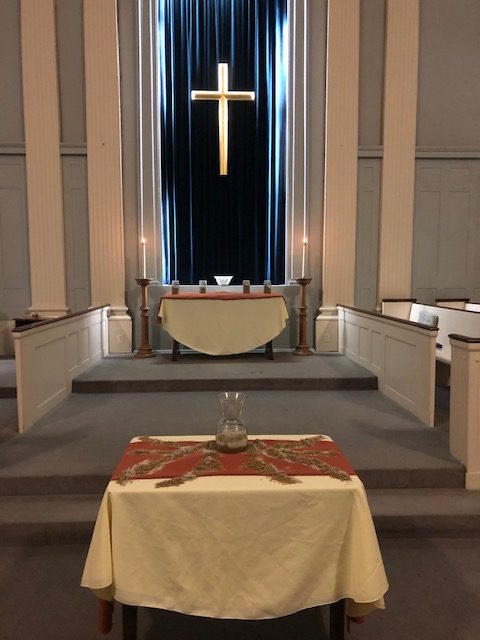
Perhaps fear keeps us from acting in love.
Perhaps pride blinds us to our faults and sentences us to repeat our failings.
Perhaps gossip provides a false sense of community as it undercut real connection.
Perhaps our body image has skewed our idea of God’s goodness.
Perhaps our addiction to disposable goods is blocking us from God’s lush and good creation.
Perhaps fear of being authentic and true keeps relationships only on the surface instead of going deeper.
Perhaps addiction to busy-ness pushes God out of our schedules.
Perhaps nostalgia is blocking the beauty of God’s blessings today.
Sin [hold sand] is whatever distances us from the Divine,
Whatever separates us from our spirituality,
Whatever keeps us from being our best, most loving selves.
We all struggle with sin, because we are all human –
made of dust and fallible.
Acknowledging our humanity and our fallibility is crucial to understanding Jesus and ultimately the resurrection.
Without naming our failings or struggles,
we might begin to think of ourselves as God,
We might think we are in control and have more power than we actually do.
Such false divinity sets us up for increased suffering.
So let us take some time to honestly reflect on what separates us from God.
What struggles do we wrestle with?
What vices break connection and distance us from love?
On your paper you may share your confession with God.
You may write a word, a phrase, draw a picture –
However you want to express your sin,
Your struggles,
what it is that is keeping you from the Divine,
What is breaking connection
and distancing you from love.
After you have finished writing,
you can come forward and add your sin to the vase of dirt,
Add your sin to the sins of others –
for we are not alone in our struggles.
You may tear up your sin,
as a symbol of your desire to be free from the struggle,
Free from the sin, free from all that blocks you from God.
Time for Private Confession
In silence or with reflective music, write your sins on paper, tear up and sprinkle into ashes/sand
Unison Prayer of Confession (Psalm 51:1-17)
Whether we have written a book, a word, or nothing at all,
We are all human, all fallible, all capable of sin.
Like people throughout time,
we have fallen short of what we could be.
Faithful people throughout the centuries have confessed their sins with the words of Psalm 51.
Tonight Christians across the globe will be reading and reciting the words of Psalm 51.
So, let us join with disciples near and far to confess our sins with the ancient words of Psalm 51.

Hymn 212 What Wonderous Love is This (v1-2) (Listen Here)
Words of Assurance
Read 2 Corinthians 5:20b-21
Jesus is the one without sin who took on our sin that we could become the righteousness of God.
Traditional atonement theory professes a God that required sacrifices for the people to be forgiven their sins – a ram for this, a sheep for that.
The burnt offerings were a means to cover our sin and reconcile us to God.
When Jesus died on the cross,
he was the ultimate sacrifice, the sacrifice to end all sacrifices.
(press little cross into sand to create bridge across the open vase)
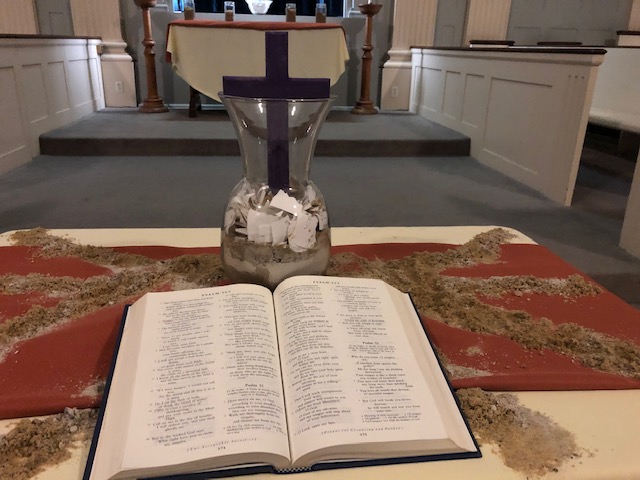
The cross was the final sacrifice, so no longer were ram or sheep needed.
All humanity’s sins were atoned for on the cross.
The cross, crosses over our sin and connects humanity to God.
We are no longer separate.
This is traditional atonement theology,
upheld by many Christian traditions.
When we have a heavy burden or a great sin upon us,
When the weight of our wrongdoing bears heavy on our hearts,
the idea that Jesus has paid the cost can be a truly liberating experience.
However, there may be times when we struggle to believe our loving God would require such a bloody sacrifice.
At such times, we can imagine the cross to be a bridge –
For on the cross, Jesus, God incarnate,
experienced the worst of humanity.
He suffered betrayal, desertion, physical agony.
Whatever suffering we are going through;
we can trust that Jesus can understand.
He too has suffered and can be with us in our suffering –
Such that in our suffering we are not separate from God,
But God is there beside us,
bringing us healing and comfort.
What’s more is that Christ’s actions show us how to bridge across our sin:
Eating with strangers, practicing hospitality,
Living simply and giving generosity, compassion, service,
Time for prayer and communion with a diverse group of friends.
These acts of love connect us to God –
the bridge across the divide of sin.
Jesus crosses over our sin and connects us to God –
Jesus bridges the divide by being the ultimate sacrifice.
Jesus bridges the divide by walking with us in our suffering.
Jesus bridges the divide by showing us how to live with love.
We enter these 40 days of Lent
as a time to journey with Jesus across the bridge,
A sacred time to release what keeps us from the Divine (lift up sand)
A sacred time to walk the bridge to closer union with God.
As we depart this night, we know where these 40 days will end –
We will find a cross that will, one way or another, bring us closer to God –
So close that not even death can separate us.
So may we go into this night,
Forgiven and made righteous in God.
May we walk into Lent,
Humbled by God’s grace and free to draw near to the heart of God.
Hymn 542 Near to the Heart of God, all verses (Listen Here)
Benediction
May you go forth in peace to draw near to the heart of God,
this night and in the days and nights to come. Amen.

